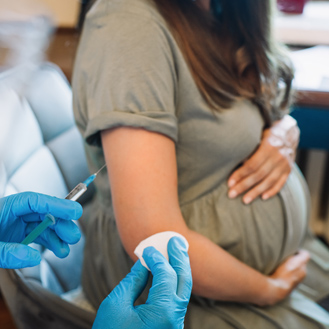
February 8, 2022
By Kathryn Lindstrom, Drexel University College of Medicine
As a fourth-year medical student applying to the obstetrics and gynecologic field, it’s weird to think that the laboring moms I’ve been there with through cervical checks, final big pushes and post-partum well wishes have never actually seen my entire face. Losing that face-to-face connection with people is just another of those harsh realities we’ve encountered with the COVID-19 pandemic continuing through the end of 2021. The innumerable losses we’ve had since spring of 2020, unfortunately, have stretched to our pregnant population as well. The stories of pregnant people requiring crash C-sections in the ICU either on oxygen supplementation or on ventilators are still haunting to this day. The added stressors that this pandemic has placed on our pregnant population is not to be understated.
Pregnancy itself was taught to me as its own “pathologic condition.” Although it can be one of the happiest moments in our patients lives, it can also be one riddled with new diagnoses and new medications that can create a trying time for our patients. Those who are pregnant or who were recently pregnant are known to be at a higher risk of a more severe case of COVID-19 (1). Babies born to pregnant people who have COVID-19 are at a higher risk of being born premature. The striving of OB-GYNs to prolong pregnancies past 37 weeks, what we call being born “at term,” is vital for the baby’s lung development and is their best chance for positive outcomes in the postnatal period.
A study done in the Department of Obstetrics and Gynecology at the Washington University School of Medicine in St. Louis sought to determine whether COVID-19 during pregnancy was associated with higher instances of gestational hypertensive disorders, including gestational hypertension and preeclampsia with and without severe features. Normally, these disorders are screened for at prenatal appointments by blood pressure readings and urinalyses. Elevated blood pressures during pregnancy can affect the development of the placenta, which can affect the delivery of nutrients to the baby and their development. These hypertensive disorders can also lead to morbidity for our pregnant parents, for reasons ranging from seizures, kidney problems, and blood clots. (2)
The study found in 1,856 births over a six-month period, where a positive COVID-19 test was found in 83 women, there was almost a two-fold risk of hypertensive disorders of pregnancy (95% confidence interval, 1.13-3.31). Though COVID infection was not associated with a more severe case of the hypertensive disorders, this suggests that COVID infections greatly increase the morbidity risk for our patients. (3) Decreasing the risk of these outcomes for patients can largely be achieved by vaccinations and continued social distancing measures until we know our world is safer for these vulnerable individuals.
The best thing that we can do as a field is recommend to our patients and our loved ones that they get vaccinated and obtain their booster shots. The CDC released guidance to all pregnant individuals that it is safe and effective to get the COVID vaccine during pregnancy (4). This can even give your baby the best chance of fighting COVID in the outside world! Antibodies (basically our body’s immunologic fighters) are passed from the parent during their pregnancy and through breast milk after birth. If it was me, my mother, my daughter, my sister, my cousin – I would want them to have the most information and best chance at protecting themselves and their new baby from a severe COVID infection. Hopefully this mentality can help us as health care workers keep recommending vaccines as we approach year two of the pandemic and can help our pregnant population be the most protected in this ever-changing environment.
Sources/Resources:
- “Understand How Covid-19 Might Affect Your Pregnancy.” Mayo Clinic, Mayo Foundation for Medical Education and Research, 24 Nov. 2021, https://www.mayoclinic.org/diseases-conditions/coronavirus/in-depth/pregnancy-and-covid-19/art-20482639.
- “High Blood Pressure (Hypertension) during Pregnancy.” Cleveland Clinic, https://my.clevelandclinic.org/health/diseases/4497-high-blood-pressure-hypertension-during-pregnancy.
- Rosenbloom, Joshua I., et al. “Coronavirus Disease 2019 Infection and Hypertensive Disorders of Pregnancy.” American Journal of Obstetrics and Gynecology, vol. 224, no. 6, 2021, pp. 623–624., https://doi.org/10.1016/j.ajog.2021.03.001.
- “COVID-19 Vaccines While Pregnant or Breastfeeding.” Centers for Disease Control and Prevention, 6 Dec. 2021, https://www.cdc.gov/coronavirus/2019-ncov/vaccines/recommendations/pregnancy.html?s_cid=10484:covid%20vaccine%20for%20pregnant:sem.ga:p:RG:GM:gen:PTN:FY21.